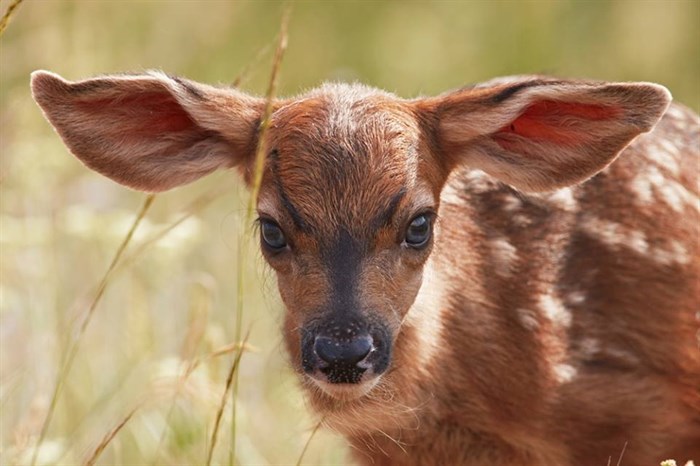
This photo was shared by WildSafe B.C. as a warning to the public not to pick up wildlife.
Image Credit: FACEBOOK/Peter Sulzle
June 12, 2017 - 8:00 PM
VERNON - They may appear helpless and abandoned, but the best thing you can do for baby deer is to leave them alone.
In the past two days, local wildlife control expert Pete Wise received three calls from people who picked up fawns, believing them to be orphaned.
“They pick them up, they figure they’re dying,” Wise says. “I basically yell at them ‘leave them alone.’ There are no polite words for this — you are basically killing this animal.”
Mother deer will often leave their fawns alone for long periods of time, returning throughout the day to nurse, according to the B.C. Conservation Service. It’s typical for fawns to lie quietly in vegetation for hours at a time, particularly in the first two weeks of their lives when they’re not strong enough to follow their mothers.
But if humans remove the fawns from their resting spots, the babies can actually become orphaned.
“People have brought me fawns on more than one occasion,” Wise says. “We try to take them back to where they were picked up.”
He says people who are not trained in wildlife control should not take it upon themselves to ‘help’ a baby animal.
“The worst is when they put them in their houses for two to three days and the deer starts bonding with them. Then it’s a horror story,” he says. “Especially in the case of a buck, they grow antlers and the next thing you know the deer becomes aggressive and ends up put down.”
Feeding or picking up wildlife is illegal under the Wildlife Act and could result in a fines.
Conservation officer Ken Owens says fawning season is already underway and will last until early July.
Doe deer and cow moose can be particularly dangerous during fawning and calving season, Owens says, and attacks on people and pets by mothers aggressively defending fawns and calves are reported each spring.
"Give them plenty of space and distance," Owens says.
Bicyclists, runners and dog walkers should keep alert especially since they can swiftly top hills or round corners and run into wildlife. Walking with leashed dogs and making noise to alert wildlife to your presence is always a good precaution, Owens says, but may not be enough to avoid clashes with deer or moose.
"Newborn fawns and calves aren't able to run from pets or people on bicycles," Owens says. "Mothers are likely to stand their ground, even when they hear you coming."
If a fawn, moose calf or bear cub is encountered without its mother immediately in view, be alert because you may have walked between them, Owens says.
The best course of action is usually to back away and leave from the direction you came.
If you observe a young animal that appears to have been left alone for an extended period of time, contact the B.C. Conservation Officer Service through the Report All Poachers Polluter (RAPP) hotline at 1-877-952-7277 or #7277 on mobile.
To contact a reporter for this story, email Charlotte Helston or call 250-309-5230 or email the editor. You can also submit photos, videos or news tips to the newsroom and be entered to win a monthly prize draw.
We welcome your comments and opinions on our stories but play nice. We won't censor or delete comments unless they contain off-topic statements or links, unnecessary vulgarity, false facts, spam or obviously fake profiles. If you have any concerns about what you see in comments, email the editor in the link above.
News from © iNFOnews, 2017